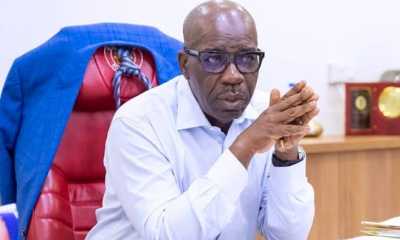News
Anambra Withdraws from Legal Challenge Against EFCC’s Legitimacy

The Anambra State Government announced on Tuesday that it has withdrawn from the lawsuit aimed at declaring the operations of the Economic and Financial Crimes Commission (EFCC) illegal.
Anambra’s Attorney General, Prof. Sylvia Ifemeje, informed the Supreme Court that the state no longer wishes to participate in the legal action initially initiated by Kogi State. The withdrawal notice was dated October 20.
This announcement coincided with Osun State’s request to consolidate its grievances against the EFCC with those of Kogi State. Osun’s Attorney-General, Mr. Oluwole Bada, stated before a seven-member panel led by Justice Uwani Abba-Aji that Osun seeks the same reliefs as Kogi.
Sokoto State, previously included as a co-plaintiff, did not send a legal representative to the proceedings. However, Kogi, Kebbi, Katsina, Jigawa, Oyo, Benue, Plateau, Cross River, Ondo, Niger, Edo, Bauchi, Adamawa, Taraba, Ebonyi, Imo, and Nasarawa were present.
The Attorney-General of the Federation, Prince Lateef Fagbemi, SAN, represented the EFCC as the sole defendant and did not oppose Anambra’s withdrawal from the case.
Previously, 16 states had approached the Supreme Court to challenge the legitimacy of the EFCC, asserting that it was not properly established by the administration of former President Olusegun Obasanjo. The EFCC was created by an Act of the National Assembly on December 12, 2002, and began operations on April 13, 2003, after the Senate confirmed its first Executive Chairman, Mallam Nuhu Ribadu. The Act was amended in 2004.
In their suit, the states argue that the EFCC’s establishment violated Section 12 of the 1999 Constitution, which requires the approval of a majority of state Houses of Assembly for such legislation. They contend that the establishment of the EFCC did not involve the necessary state approvals.
The plaintiffs maintain that any agency formed under an invalid Act should be considered illegal. They emphasize that the 1999 Constitution is the supreme law, asserting that any National Assembly Act inconsistent with it must be declared void.
Kogi State has posed six questions for the Supreme Court to consider, seeking nine primary reliefs, including: “A declaration that the Economic and Financial Crimes Commission (EFCC), the Nigerian Financial Intelligence Unit (NFIU), or any agency of the Federal Government cannot investigate, requisition documents, invite and/or arrest anyone concerning the administration and management of funds belonging to Kogi State or any Local Government Area of Kogi State.” Additionally, they seek a declaration that the Federal Government lacks the authority to issue directives related to the management of Kogi State’s funds.
Kindly contact us @ info[@]wordspired.com.ng
Call or Whatsapp: +234 803 951 2443, +234 902 474 4290

 News5 years ago
News5 years agoOmar Bolaji Gambari: The new Mr. Fix It in Aso Rock?

 News6 years ago
News6 years agoYou are in trouble, Shekau threatens Chadian President Idris Deby

 News5 years ago
News5 years agoMaryam Onikijipa-Belgore: Living an Impactful Life for the Downtrodden

 Entertainment5 years ago
Entertainment5 years agoAfro fusion act TYMZY set to excite music fans with debut collection

 Entertainment5 years ago
Entertainment5 years agoSaidi Balogun’s latest movie White/Funfun hits the market, making waves on YouTube

 News6 years ago
News6 years agoDutch top football league may be cancelled

 News6 years ago
News6 years ago“Ego is the major problem affecting Yoruba race” – Oba Frederick Akinruntan

 Metro6 years ago
Metro6 years agoSuper cop, Yinka Egbeyemi distributes COVID-19 palliatives, turns heat on Lagos hoodlums





































